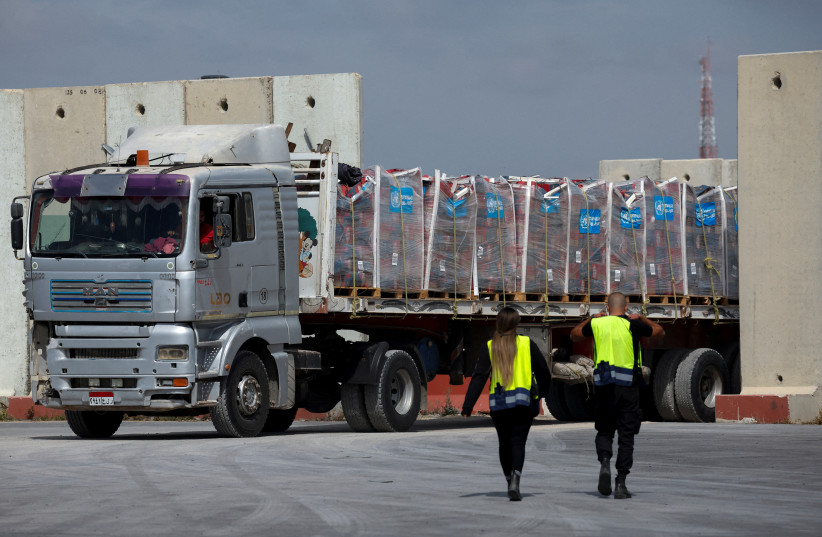US not discussing Gazan deportation, Syria situation precarious, Rubio tells Senate -analysis
Washington has asked other countries in the region if they would be open to accepting Gazans who voluntarily opt to leave.

Working with the new Syrian government to stabilize the country is important, US Secretary of State Marco Rubio said Tuesday at a Senate Foreign Relations Committee hearing.
Last week, US President Donald Trump met with Syrian President Ahmed al-Sharaa and said the US would end sanctions on Damascus. The meeting was positive and supportive of a new post-Assad regime in Syria.
If the US does not engage with the new government in Damascus, then things in Syria definitely would not work out, Rubio said. Furthermore, Syria could split apart into a new phase of civil war of “epic proportions” within weeks or months, he added.
On a positive note, Rubio said Syria’s diverse groups – Sunnis, Shi’ites, Christians, Druze, Alawites, and Kurds – feel a sense of Syrian identity. These people lived alongside one another with a Syrian identity until the Assad family, which ruled Syria from the 1970s until December 2024, pitted them against each other, he said.
Syria’s new leadership has a problematic background, Rubio said, citing Sharaa’s past connections with al-Qaeda. The goal now is to see if Sharaa can be trusted, he said.

Most media outlets focused on Rubio’s warning about Syria slipping into civil war within weeks. Those reports, however, ignored the context of his comments. He was arguing for working with the new government, which is the official policy of the Trump administration.
A willingness to do things that are outside the box is typical of Trump. He prefers personal meetings, diplomacy, and sizing people up. He did so with Sharaa in Riyadh and decided that the Syrian was ready to lead.
Sharaa was supported by Saudi Arabian Crown Prince Mohammed bin Salman and Turkish President Recep Tayyip Erdogan in his meeting with Trump. Qatar also backs the new Damascus government.
Sharaa used to run Hay’at Tahrir al-Sham, a group once linked to al-Qaeda. Today, the new Syrian transition government has 24 cabinet ministers – half of them from HTS, while half are independents, including a Christian woman, an Alawite, a Druze, and a Kurd.
The HTS cabinet ministers are mostly young men, and they are primarily Sunni Arabs who played a role in governing parts of Idlib between 2017 and 2024. Some have close ties to Turkey.
Trump facing pushback in Washington over meeting Sharaa
TRUMP’S DECISION to meet Sharaa and cancel the sanctions is facing pushback in Washington. There is inertia that wants to keep them in place. Sanctions are like an oil tanker; they can’t shift course quickly.The European Union moved to end sanctions on Syria, even as Rubio was speaking at the Senate committee meeting. This puts wind in the sails of Trump’s decision.
There are those who oppose this move, however, and some of them have ties to the Trump administration and the State Department. Therefore, this move may not happen as fast as some may want, and it may face hurdles or a kind of temporary status.
Sharaa also faces hurdles in Syria. While he has secured many foreign meetings and support, there are many domestic difficulties.
Every day, groups including ISIS cells and pro-Assad camps challenge the new government. The government is also working on integrating the US-backed Syrian Democratic Forces in eastern Syria into the government. It wants all armed groups under the banner of the new security forces.
Meanwhile, the US wants foreign fighters to leave Syria, as well as Palestinian terrorist groups. Damascus has cracked down a bit and detained some Palestinian members of armed groups.
It removed men such as Ahmed Awda from power in southern Syria. Awda was a local warlord and a former Syrian rebel who then worked with the regime and the Russians.
Israel has also demanded that southern Syria be demilitarized, which makes it hard for Damascus to assert control.
Therefore, the new Syrian government faces many challenges in securing the country. It finds weapons being smuggled every day, and it has uncovered explosive mines, as well as rockets and missiles, near the Lebanese and Iraqi borders.
Sharaa not able to attend Arab summit
Sharaa was not able to attend an Arab summit in Iraq due to opposition from pro-Iranian groups in Iraq.Sharaa has support in much of the region, but there are suspicions in Israel, Washington, and among pro-Iranian groups and others.
Rubio tried to balance these issues in his discussion. He provided a good analysis of why the US should move to work with Damascus. If not, then Syria could lose stability or end up working with anti-Western countries, he said.






